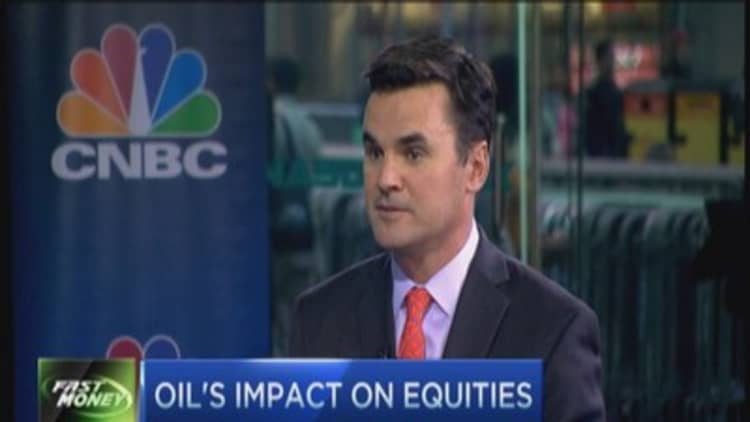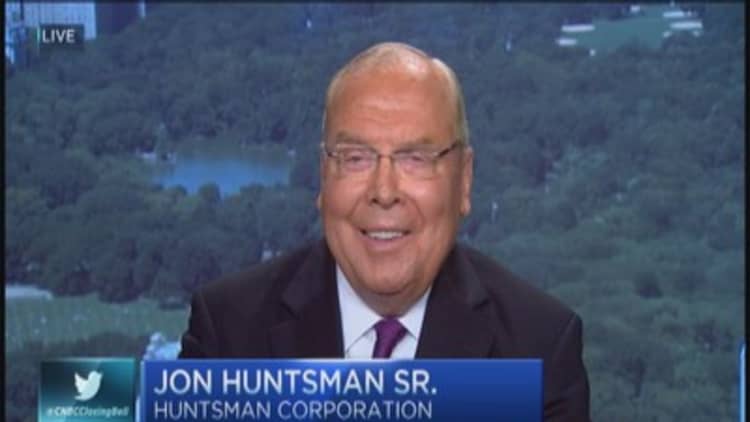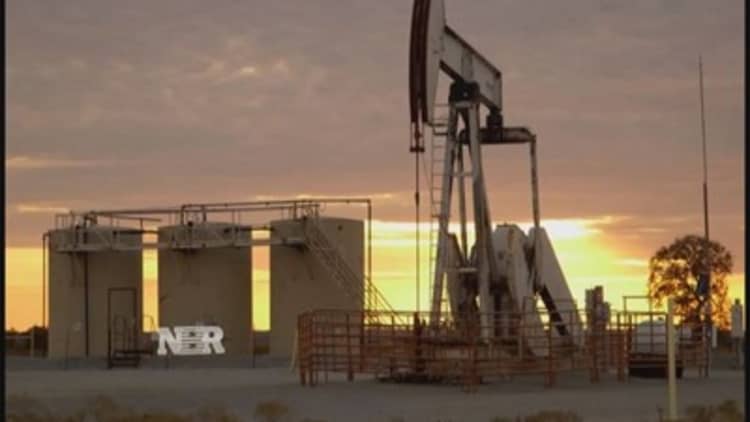


Gasoline prices could fall below $3 a gallon nationwide by the weekend, and the already big savings for consumers could give the economy a growth spurt as it fuels other parts of the economy.
The sharp drop in gasoline prices this month could also put some jingle in holiday sales, and economists expect to see several tenths added to fourth-quarter GDP growth. The national average per gallon of unleaded gasoline Tuesday was $3.03, 6 cents cheaper than a week ago and $0.31 below a month ago levels, according to AAA.
The boost in consumer spending on things other than gasoline will probably show up in real spending in November and December data. "The hope I'm sure in the retail sector is that the extra money that consumers find in their pockets is going to be spent in the holiday season," said Stephen Stanley, chief economist at Amherst Pierpont Securities.
"Every penny on seasonally adjusted gasoline prices should be worth about $1 billion," Stanley said. "Over the course of the year...That's probably an extra three or four tenths on GDP. I think that will help at the margin." Economists say for the savings to carry real punch, the drop in gasoline prices from the summer high near $3.70 per gallon will have to be prolonged.
Gasoline prices are expected to continue to drop into November. "It should go to $2.80 by Thanksgiving. I think November is when it's going to bottom out," said Andrew Lipow, president of Lipow Oil Associates. "I'm expecting gasoline to be at these low levels at least through the end of the year and through the end of the winter."
Read MoreEnergy pros focus on holiday time … Christmas 2010
Lipow said he expects lower crude prices—at about $80 per barrel for West Texas Intermediate—to keep a lid on gasoline prices. WTI was at $81.13 per barrel in afternoon trading Tuesday. Lipow's forecast has been that gasoline should reach $3 by Saturday.
"While it might be bad for the oil industry, there's a whole lot of other segments of the economy that benefit, like the truckers, the railroads, the farmers... Manufacturing in general benefits from lower energy costs," Lipow said. The airlines also benefit, and the Dow Transports soared 1 percent to a record high Tuesday.
Diane Swonk, chief economist at Mesirow Financial, expects that cheaper gasoline will add several tenths to the current quarter's GDP growth, which she forecasts at 2.9 percent.
Swonk said some of the savings from gasoline should show up in holiday gifts and some will go to the grocery store.
The National Retail Federation said it expects this year's holiday sales to increase by 4.1 percent, above the 10-year average of 2.9 percent and the first time sales growth should surpass 4 percent since 2011. Holiday sales are expected to total $616.9 billion.
Craig Johnson, president, Customer Growth Partners, expects more of the gasoline savings to flow to supermarkets than is realized. "The bigger factor this year is the rise in food prices, particularly center of the plate—meats are at an all time record high. Produce is near a record high, and dairy is at an all time high. If you look at the household budget, people spend two to three times as much on food as they do on gasoline," Johnson said. He added that those figures do not show up in CPI.
Swonk said while food does have an impact, people also make dietary choices, such as switching to pasta from meat, to temper the impact of rising prices.
Read MoreFor some states, cheap oil isn't such a good thing
"There is some offset with food. My expectation is that it will add a couple tenths to overall GDP growth in the fourth quarter," she said. "Since June, we're off on a 12-gallon tank about $6 or $7. That's on the margin. It is extra cash that means something." Consumers are also getting the boost from cheaper gasoline at the same time they are seeing the benefits of actively refinancing their homes again.
As gasoline prices plummeted, consumer confidence soared to 94.5 in October, from 89 in September. But Deutsche Bank chief U.S. Economist Joseph LaVorgna said the consumer confidence jump to 94.5 versus 89 in September, may have more to do with improvements in the job market than the drop in gasoline prices. While gasoline is part of it, he said the gain was more in future expectations.
"It's still early. We were $3.71 in April, then were at $3.70 in June. It's really only in the last six weeks, where prices have moved a lot lower. If it continues to stay this way, it's going to be, in my mind, very additive to GDP. The current drop, if it stays this way would add 40 basis points to GDP. If you have the economy growing at 3 percent, it would be 3.4. If in two months from now, it were to go up $0.40, then we're going to wash most of it out."
LaVorgna said if gasoline prices stay lower, however, the economy should bounce. "If we're getting a positive supply shock as opposed to a negative supply shock, we should see a bounce. A lot of people on fixed incomes, teenagers, college students, people who live pay check to pay check, or whatever, energy is a necessary thing to spend money on. If they don't have to spend as much, that allows them to spend else where," he said.


